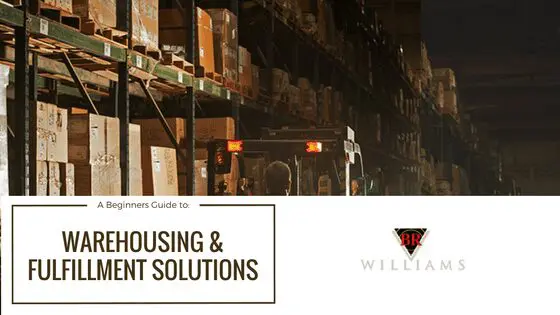
Just about every successful business grows to the point where some tasks can’t be performed in-house. As a result, it often makes sense for growing businesses to outsource their warehousing and even order fulfillment responsibilities.
Of those who choose to outsource warehousing and fulfillment services, the majority do so because they don’t:
- …have the proper space to accommodate inventory levels
- …have the know-how to perform services consistently at a high level
- …have the personnel or resources required to satisfy all aspects of order fulfillment like staff, expertise, equipment, and enabling technology
Eventually, the business owner, management and staff find that they are in over their heads, spending an abundance of work hours on excessive storage, shipping and receiving duties that were nowhere near as strenuous when the business was still in its infancy.
Sooner or later, these overworked individuals determine that their time could be better spent focusing on the business’s primary activities. This is precisely why so many business owners and managers outsource warehousing, fulfillment and other distribution center activities.

When a business reaches the point where additional storage space or distribution services are necessary, it is time to ally with outside organizations that specialize in these solutions. The future alliance also proves beneficial if the overburdened business is simply lacking human capital or the most precious resource of all – time.
When the business is evaluating its current warehousing and order fulfillment solution (in-house or outsourced), there are certain aspects that should come under consideration.
Plenty of outside organizations have the space, manpower and time necessary to provide warehousing and fulfillment in one organized space. Some companies offer these services a la carte.
So, what to look for and how to decide?
Let’s review the core services, key terminology and related aspects involved in best-in-class warehousing and fulfillment.
An Overview of Traditional Warehousing Services

When a business requires storage space, it needs a warehouse or similar structure. A warehouse serves the purpose of accepting incoming inventory deliveries from a source which is often the manufacturer. It is imperative that the selected warehouse can store inventory in a safe manner, free from threats like theft, fire, water damage etc.
In reality, storage space doesn’t have to be a gigantic “big box” space that is officially labeled as a “warehouse”.
Some growing businesses, that are short on capital, resort to using empty garages, basements, attics and rental storage spaces! As long as inventory can be delivered, picked up and stored in a safe and efficient manner… the site could serve as a functional warehouse.
Ideally, the business will eventually lean on a well-run warehouse with hundreds of thousands of square feet to accommodate inventory across posterity. Even if the space is not used fully in the near future, a well suited storage facility could prove essential as the business hits its stride and requires additional capacity and shipping/receiving operations. Depending on the business’ needs a warehouse that can go the extra mile by offering both space and order fulfillment services all under one roof could prove invaluable.
An Overview of Traditional Order Fulfillment Services

A “fulfillment house” is commonly implemented as a warehouse service to broaden the services available in the distribution center and whereby make the center more attractive to current and potential clients.
Fulfillment houses serve to transmit orders as directed by the client. For example, if a retail outlet requests 100 units of your business’s products, you might transmit the order details to the fulfillment house/distribution center for order fulfillment. Once the fulfillment house receives this information, it’s staff will proceed to handle the fulfillment of the order.
On the surface, this capability sounds simple enough to find. However, a number of variables play a role in determining which fulfillment house is best to do business with.
10 Top Factors to Consider When Selecting a Fulfillment House
For starters, it’s not prudent to sign an agreement with the first fulfillment house you find.
1. Your Current Needs
Take a close look at your company’s current needs. Then try to extrapolate your supply and demand levels across the ensuing months and even a couple years into the future.
2. Your Short-Term Future Needs (Few Months or Years from Now)
If you manage your warehousing and fulfillment in-house today, you can fulfill your current orders at the moment, you might need more space and assistance in a few months or years. If a spike in sales is expected in the near future, the time to ally with a fulfillment house is right now.
Find a suitable fulfillment house that allows your business to grow without hindrance. This way, you won’t be stuck with a backed up order queue in a few months… or a year, and not have a way of fulfilling the requests.
3. Reputation of Fulfillment House
Of critical importance is the fulfillment house’s reputation in the community. Do some research (online might be the easiest) on the reputations of fulfillment houses. If they don’t have a solid track record of success serving the fulfillment needs of other businesses, do not trust them with your inventory and orders.
4. Years of Experience of Fulfillment House
Vet each prospective fulfillment house in terms of years of experience, quality control protocols, their clients’ industries, services offered and even the extent of their knowledge of shipping regulations.
5. Value-Added Services from Fulfillment House
Certain fulfillment houses offer helpful “value-added services”. An example of such a service is in-depth analysis of client needs that generate solutions to boost efficiency and reduce shipping costs. Do not hesitate to ask for a “go-to” resource within the organization who will help mastermind critically important strategic fulfillment solutions.
6. Know Associated Costs
Before you make your final decision on a fulfillment house, make sure you have a thorough understanding of all associated costs. Perform a price comparison between several fulfillment providers before forging an alliance.
In the context of order fulfillment, costs are usually represented in line item form. Examples of such costs include fees for shipping labels, packaging, stacking/shelving, setup and storage per square foot or pallet. Each cost should be detailed in a written contract before any sort of business agreement is reached.
7. Chargeback Fees
Of critical importance is quality control. Orders transmitted with mistakes have the potential to result in retailers tacking on a chargeback fee. You have every right to know exactly how a vendor will proceed if order errors lead to such a chargeback fee.
8. Overall Financial Impact / Total Cost of Ownership (TCO)
Once you have a feel for the direct cost associated with the program, give thought to the overall financial impact of the relationship. Some like to call this the Total Cost of Ownership (TCO).
You can’t grasp the entire financial picture until you capture all the financial implications of the future partnership. For example: will this alliance cost (or save) you time, money or opportunities that need to be factored into the overall financial analysis? Get the full picture as you narrow the list of prospects.
9. Check References
Whittle down the prospects to a couple that stand out from the pack, then check references from current and former customers. Do not be afraid to ask highly detailed questions when conducting reference checks. Inquire about quality control, customer service, speed and anything else your business values.
10. Visit the Warehouse
Finally, don’t hesitate to visit the warehouse. Walk the offices and floor to take a close look at the operation to see if it lives up to the sales pitch.
Satisfy Your Fulfillment Needs Once and for All
Whittling down a long list of prospective fulfillment houses can prove quite difficult. If your team possesses slightly less warehousing and distribution experience than desired… get some advice from others.
It may help to consult with local business veterans and colleagues who have experience finalizing warehousing solutions. Even asking long-time U.S. Postal Service workers for recommendations on top-notch fulfillment centers can prove enlightening.
Some businessmen refer to their local chamber of commerce for feedback on the best local fulfillment centers. Others attend trade shows to pinpoint fulfillment-oriented businesses that have zeroed in on a particular business niche.
Take your search to the web by conducting a fulfillment center search at the International Warehouse Logistics Association website: www.iwla.com.
Select one or several businesses for your warehousing and fulfillment needs and you will reclaim your in-house work areas. Let the storage and fulfillment experts do what they do best while you relish the return of your much-needed space, manpower and time.
Conclusion
If you enjoyed this “Beginner’s Guide to Warehousing & Fulfillment Solutions” and would like to discuss certain topics in greater detail, contact us.
Outsourcing and Fulfillment FAQs
About BR Williams Trucking & Logistics
BR Williams, a family-owned Trucking, Warehousing, Fulfillment & Logistics Company has been serving customers since 1958. We specialize in removing the supply chain frustrations our customers have by developing custom-made solutions. We offer nationwide transportation services through our fleet and logistics division. Our multiple fulfillment and distribution warehouses in Alabama span over 1.7 million square feet. Our core values are HONESTY, INTEGRITY, SERVICE. We still serve our first customer that was established in 1958.
To discuss your supply chain needs, please contact us online or call (800) 523-7963



